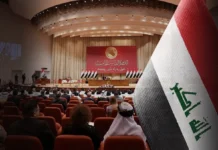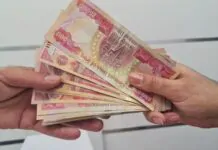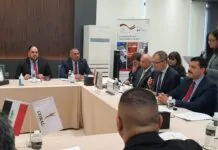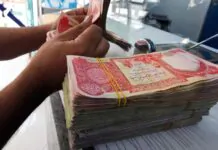Tishwash: Stay tuned… an expanded meeting will be held tomorrow in Baghdad to discuss the re-export of the region’s oil.
Iraqi parliament member Sherwan Dubardani confirmed on Saturday that a delegation from the Kurdistan Region, headed by the Minister of Natural Resources, had arrived in Baghdad. He explained that the capital would host an expanded meeting tomorrow between the Kurdistan delegation and the federal government to discuss the re-export of the region’s oil.
“The Kurdish delegation is currently holding a meeting, and an expanded meeting between Erbil and Baghdad is expected to be held tonight or tomorrow, Sunday, to discuss the region’s oil file,” Dubardani said in a statement monitored by Al-Masry.
Kurdish media outlets quoted political sources regarding the upcoming meeting, stating that it will include Deputy Prime Minister Fuad Hussein, the Iraqi Oil Minister, a representative from the Iraqi State Oil Marketing Organization (SOMO), the Kurdistan Regional Government’s Minister of Natural Resources, and a delegation from the region heading to Baghdad.
She pointed out that “a joint statement on the outcomes of the meeting is expected to be issued after its conclusion.” link
Tishwash: Sharp fluctuations in the value of the Iranian currency amid regional tensions between Tehran and Tel Aviv.
Iranian markets have witnessed sharp fluctuations in the Iranian toman’s exchange rate over the past few days, directly influenced by the escalating geopolitical tensions between Iran and Israel. The US dollar’s exchange rate against the toman reached 9 million tomans at the height of talk of a possible direct war, after it had been expected to reach 10 million.
But with signs of calm and de-escalation between the two sides, the value of the toman has risen again, amidst a state of uncertainty that has gripped the market.
Decrease in trading volume and warnings against risk
“We sold the dollar for 7.6 million dinars, but we didn’t buy back because of the price fluctuations,” Kawa Yahya, an exchange office owner, told a Kurdistan 24 reporter. “The price had risen to 9 million tomans this morning due to the escalation, but later dropped to 7 million, which represents a difference of nearly 2 million in a very short period.”
Money changers confirmed that toman banknotes are becoming less available in the market, and that daily trading volume has fallen to approximately 60% compared to previous levels.
Conditional optimism and expectations of more volatility
For his part, Shawan Muhammad, an exchange office owner, said, “After the calm, the toman began to regain some of its value, but its fate remains uncertain. There is talk of an impending agreement between the United States and Iran, and if it actually materializes, the toman will regain its strength. So far, Tehran has not conceded its interests, so we expect the market to remain volatile.”
Observers believe that any new security or political unrest among the countries of the region would immediately impact the toman’s exchange rate and trading volume in the Iranian market.
Despite the lack of stability, approximately 10 billion tomans are still traded daily, a source of concern for traders who face significant financial risks amid the lack of clear guarantees regarding the future of the Iranian currency. link
************
Tishwash: An economist warns of the continued dominance of the dollar in Iraqi-Chinese trade.
Data from the Chinese Customs Authority showed a significant increase in the value of Chinese exports to Iraq during the first five months of 2025, increasing by 9.5% compared to the same period in 2024. The value of these exports reached $7.4 billion, compared to $6.77 billion during the same period last year, according to a report by economic expert Manar Al-Obaidi.
Al-Abidi explained that this growth is driven by increased exports from a number of sectors, most notably:
Electrical and mechanical appliances : accounted for 24% of total exports and achieved a growth rate of 11.46%.
Electronics : represented 15% of exports and increased by 29.3%.
Clothing : accounted for 7.6% of total exports and increased by 21%.
Cars and spare parts : Its share reached 7.2% and recorded the highest growth rate of 35%.
In contrast, Iraqi exports to China declined by 5.77% during the same period, reaching $15.2 billion compared to $16.14 billion in 2024, and are almost entirely limited to petroleum products.
Despite the decline, the trade balance between the two countries remains in Iraq’s favor, with a trade surplus of $7.7 billion during the first five months of 2025, down from $9.37 billion during the same period the previous year.
Al-Obaidi pointed out that “this surplus remains fragile, as it is almost entirely tied to Iraq’s oil exports to China in terms of quantity and price. Any decline in the value or volume of these exports could lead to a shrinkage of the surplus or its transformation into a deficit, which necessitates diversifying Iraq’s export base by boosting exports of raw materials and local goods.”
Although annual trade between Iraq and China exceeds $54 billion, financial transactions between the two sides continue to be conducted in the US dollar, whether for oil sales or imports.
Al-Obaidi called for “the establishment of a direct financial and trade exchange platform between Iraq and China, similar to what other countries have done, such as the recent agreement between China and Turkey to adopt local currencies in trade exchanges.”
He promised that “reducing dependence on the dollar represents a strategic step towards enhancing financial independence and increasing the effectiveness of bilateral trade.”
It should be noted that this data represents direct Chinese exports to Iraq and does not include goods exported to other countries, particularly the UAE, and then re-exported to the Iraqi market. link





